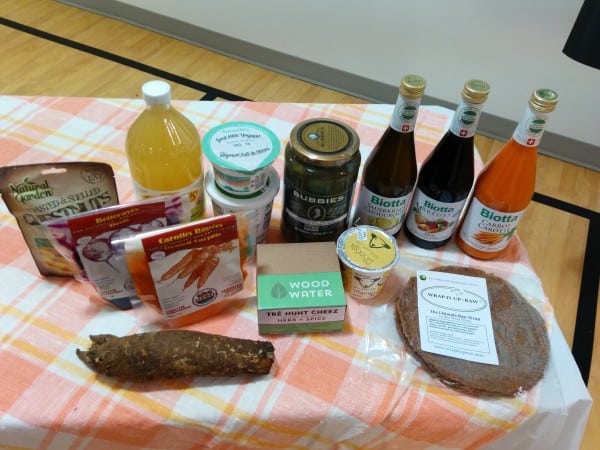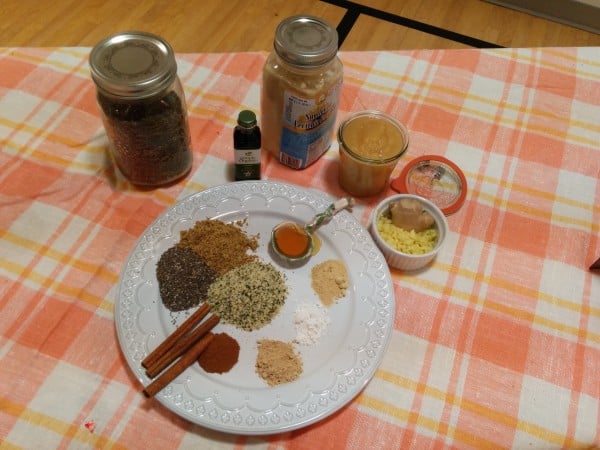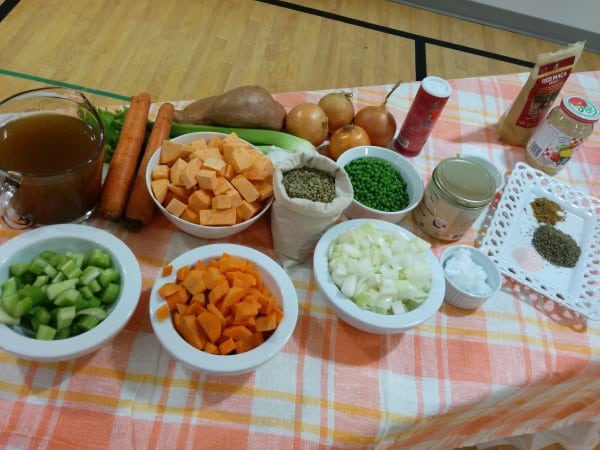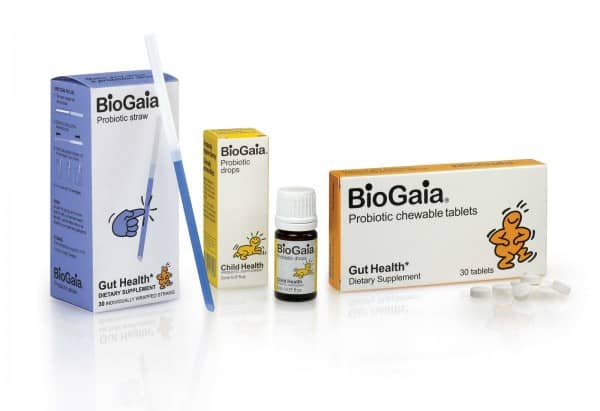Last Saturday morning was an inspiring and enlightening day for me, and super fun for my kids as well. I learned so much more than I expected at the “BioGaia: The Pros of Probiotics for Children” which was an educational discussion event about health and probiotics. The event was held at Kidville, where my kids enjoyed playing their hearts out for free! This event was hosted by celebrity health experts Bryce Wylde who specializes on alternative medicine, and Julie Daniluk, RHN, a holistic nutritionist.
The talk started with a brief introduction by Bryce Wylde, about the current situation in North America regarding common gastrointestinal problems and how this relates to probiotic deficiency, as well as the current trend regarding probiotics and their invaluable importance. Here are a few important points:
- With 75 million North Americans suffering from upset stomachs in various forms (gas, bloating, colic, constipation, diarrhea, acid reflux, heatburn, IBS, etc.), and 80 million people getting food-bourne illnesses every year, we can see a strong link between diet and gut issues.
- Probiotic deficiency is a root cause of poor gut health, and the biggest contributing factor for probiotic deficiency is (you guessed it!) the use of antibiotics.
- While antibiotics are indeed life-savers for treating infections, these also kill even the good bacteria in the body. That’s why it’s important to supplement with probiotics after the course of antibiotics, so that the gut’s natural microbiome diversity can be restored.
- The good news is, our awareness about proper gut health and the importance of probiotics has been increasing based on probiotic sales statistics in North America.
- With the probiotic businesses flourishing, we should be keen on the quality of probiotic products we choose, and for what purpose.
- The World Health Organization (WHO) defines probiotics as “live micro-organisms which, when administered in adequate amounts, confer a health benefit on the host”.
- Bryce explained the function of probiotics as the “balancing act” for different species of bacteria in our gut to maintain good health.
- Some examples of conditions that can be offset by probiotics are high-sugar and low-fiber diets, the use of antibiotics, and C-section procedures.
- Vaginally delivered babies benefit from their very first exposure to a culture of probiotics, which can only be obtained by passing through the vaginal canal. Because C-section babies become deficient from this, and could be more prone to allergies, eczema, ADHD, autism, and other identified disorders. And so vaginal swab became a way to introduce the mother’s birth bacteria to the baby and minimize health risks associated with C-section delivery.
- Probiotics have PNEI (Psycho-Neuro-Endocrine-Immune) functions, sending messages from our gut to our brain. They control our mood, nerves, hormones, and immune system.
- Aside from the benefits of probiotics in inhibiting growth of bad bacteria and reducing gastrointestinal disease symptoms, many studies are currently proving its ability to treat skin conditions, allergies, ADHD, and even depression.
The second part of the event was hosted by Julie Daniluk, where she put Bryce Wylde’s sharing of concepts to practical application. Here are some great things I learned:
- Poor gut health = STRESS
- Our food choices is dictated by our stress levels. Whoa! That explains the craving.
- Real example: A child experiencing night terrors after a food poisoning incident, was healed with probiotic treatment. Night terrors were gone!
- The two biggest allergenic culprits are: (1) white flour, and (2) dairy.
- People with low diversity of gut bacteria have increased growth of allergens.
- You can get over food intolerance, like lactose intolerance, when there is enough good bacteria to break down lactose
- It takes 12-24 months after a course of antibiotics to recover your body’s microbiome diversity, and antibiotics are not selective in killing bad vs good bacteria. Thus, supplementing with probiotics is beneficial.
- We did some yoga squats to keep our energy during the talk, and I’ll do this from now on!
- Prebiotics are good fibers that are absorbed by good bacteria, and are necessary for probiotics to survive.
We learned from Julie about healthy food alternatives that are organic, allergen-free, and rich with prebiotics and probiotics. She also shared prebiotic-rich recipes that kids will love, and encouraged us parents to empower our kids by giving them healthy choices:
- Some white sugar-free food with good bacteria: goat yogurt, cashew and almond yogurt, and sheep yogurt, which are sweetened with honey or maple syrup
- Some hypoallergenic fermented food with good bacteria: cashew-based cheese, dill pickles, beet pickles, carrot pickles, flaxseed wraps, sauerkraut juice, breuss juice, carrot juice, hemp hearts
- Unpasteurized apple cider vinegar is naturally rich with good bacteria
- Burdock root is one of the highest sources of inulin prebiotic
- For constipated children, lubricate the gut with omega-3 EPA+DHA+GLA, which is also known to aid for good focus and concentration.
- Energy tip for parens: Load up on maca! Julie doesn’t recommend giving this to kids though, because it will only give them more energy than they already have.
- A kid-friendly shepherd’s pie recipe: use sweet potato, sweet peas, carrot, lentils
- Julie shared some of the best fermented foods: beans (miso, natto) , milk (cheese, buttermik, yogurt), vegetables (kimchi, beet, unpasteurized pickles, sauerkraut), and fruits (nata de coco, Sicilian green olives)
- A golden advice I value so much: It takes 10-15 times to introduce a healthy food before your kid gets to love it. That “Just one bite” plea will work over time!
- Artichoke sweetens food. Add it on!
- Herbs and spices reduce inflammation.
- Coconut oil has good bacteria and antifungal properties.
- You can add BioGaia probiotic supplement to your kid’s food or drink without affecting the taste, or simply let your kid take it as it is.
To conlude the very informative event, here are some more good-to-know points imparted by Bryce Wylde, as well as from answers to questions asked by the attendees:
- Caution: Iron feeds bad bacteria if the gut is not diverse enough with microbiomes.
- In terms of genetically-linked disorders, you cannot change your DNA but you can manage its expression.
- Lactobacillus reuteri, a naturally occurring bacteria in humans and animals, has been documented with health benefits in protecting against pathogens, treatment of certain conditions, and overall health.
- Not all good bacteria are therapeutic probiotics.
- A good probiotic depends on count, species “fingerprint”, CFU (colony-forming unit) listing, and precise level of dose up to a certain expiry date. It should also survive passage through the GI and be acid/bile resistant.
- There is no overdosage in probiotics, but you can increase the dose of BioGaia for 2-3 times the recommended amount, if after completing a course of antibiotic treatment. This is in order for the microbiomes to reculture better.
Lactobacillus reuteri Protectis is the patented probiotic of BioGaia ProTectis. BioGaia probiotic supplements come in various forms: drops, chewable tablets, and straws, so there’s something for every child. BioGaia is a Swedish brand that has been leading in the probiotic industry in Europe and the rest of the world for more than 20 years, in terms of research and production. In fact, BioGaia was the first ever to launch probiotic chewing tablets and straws. What makes me happy to choose BioGaia as the probiotic supplement I’d give to my kids is the wonderful amount and quality of information and resources available about BioGaia products, and on Lactobacillus reuteri. It makes me feel more informed and secure.
I was really blown away by so much that I’ve learned from this symposium. The free BioGaia samples and gift basket of organic goodies were such great bonuses for my family, and not to mention the fun my kids had at Kidville! I left the place with improved awareness about gut health and how it affects our whole well-being, and with a passionate drive to be more conscious about what we consume. I hope this outline of valuable information could awaken my readers as well and feel amazed by what prebiotics and probiotics can do not only to our gut, but also to our lives holistically.






